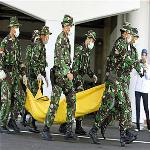21 October 2010

Photo: AP
Indonesian soldiers carry a mock victim during a joint anti-terrorism exercise with Australia's elite unit SAS at the Bali International Airport, in Kuta, Indonesia, Sept 2010 (file photo)
Australia is boosting its military ties with Indonesia, its giant northern neighbor. Regional political analysts say that while the diplomatic relationship is flourishing, there are concerns that citizens from both countries still view each other with suspicion.
Australia's relationship with Indonesia has been rocky at times. In recent years, the core problem was Australia's support for East Timor, which voted to secede from Indonesia more than a decade ago.
The ties between Australia and Indonesia, however, improved rapidly after the bombings on the Indonesian island of Bali in October 2002, which killed more than 200 people, including 88 Australians. The two nations worked closely together in the aftermath.
Ties that bind, despite suspicion
Edward Aspinall, an Indonesia specialist at the Australian National University in Canberra, says ties have endured testing times over the years.
"One way of looking at it is the strength, is that it is a relationship which has survived a great number of ups and downs. So, it is a relationship with a considerable degree of resilience and a certain degree of closeness, despite the many differences between the two countries, so it is a fairly robust relationship," said Aspinall.
While deeper understanding now exists at diplomatic levels, Fergus Hanson, a research fellow at the Lowy Institute in Sydney, said the people of both countries still view each other with mistrust.
"There is an entrenched perception at the individual level, well, from an Australian perspective, that Indonesia is a backward country," said Hanson. "Perhaps there is an element of feeling threatened by Indonesia, and I think that those feelings run both ways, that Indonesians also feel somewhat threatened by Australia, and there is a bit of suspicion about Australia's motives. So, on both sides there are these entrenched positions. There is not very good or positive feelings toward each other."
Economic, security issues
Such antipathy has affected commercial endeavors. Australia does more trade with New Zealand than it does with its much larger northern neighbor. Business people often complain that cultural and administrative obstacles hinder opportunities in Indonesia.
Aspinall said those barriers need to be overcome if Australia is to take advantage of Asia's soaring economies.
"Australia's economic future, social and cultural future, as well, lie in greater integration into the greater Asian region - and for many reasons Indonesia is very much Australia's key to that region. Closer relations with Indonesia helps Australia's economic integration, it helps Australian diplomacy in the region and plus, there are many security and other concerns which are very significant for Australia," Aspinall said. "But for Indonesia, Australia is arguably really not quite significant."
One area that is of importance to Jakarta is security. Both nations have worked closely to confront the threat of Islamic extremism across the Indonesian archipelago, which is home to more than 220 million people.
Last month, Australian Special Forces held joint operations in Bali with Kopassus, Indonesia's elite military unit, which has been accused of widespread human rights abuses over the years.
Major General Tim McOwan, an Australian Special Forces commander, said he thinks the Indonesians have changed their ways.
"In my experience, Kopassus are working assiduously to redress some of their past transgressions," he said.
Military cooperation
The United States military also plans to train with Kopassus, although Sophie Richardson, a spokeswoman for Human Rights Watch, said the Indonesian unit remains tainted by past abuses.
"Very few people from Kopassus have been investigated, prosecuted, convicted and served appropriate sentences for serious crimes," she said.
Hanson at the Lowy Institute said Australia must enhance its relationship with Kopassus, despite questions about its past, because the unit is integral to the security of Indonesia.
"There is a history of cooperation with Kopassus. It broke down in the aftermath of the East Timor intervention where there were allegations against Indonesian troops and their involvement in the killings in East Timor, but that cooperation has resumed because, I think, Kopassus really is the organization that Australia will have to turn to if there is a major terrorist event in Indonesia," said Hanson.
Australia also seeks Jakarta's backing for its plan to build a refugee transit center in East Timor.
Relations also may be tested in the months ahead as the scheduled executions draw closer of three Australians convicted of trafficking heroin into Indonesia.